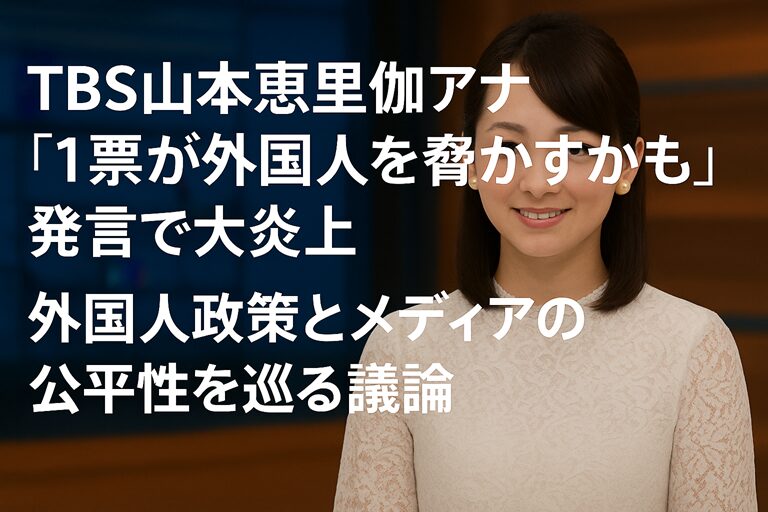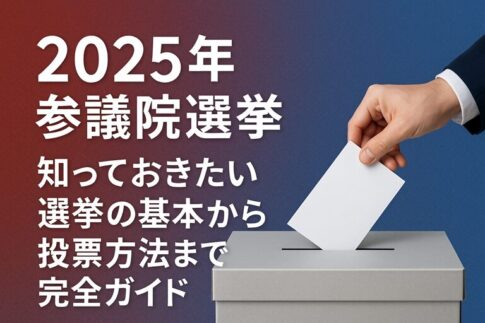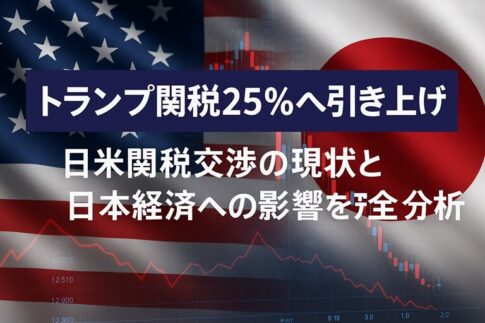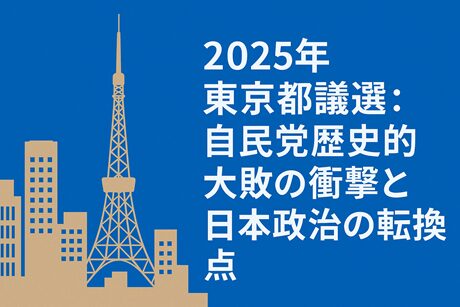目次
- 1 TBS Anchor Sparks Fury Over Immigration Vote Warning
- 1.1 1. Details of the Broadcast Content and Anchor’s Statement
- 1.2 2. Political Reactions and Sanseito Party’s Protest
- 1.3 3. Detailed Analysis of the Social Media “Firestorm”
- 1.4 4. Current State and Challenges of Japan’s Immigration Policy – Detailed Analysis
- 1.5 5. Deep Consideration of Media Impartiality and Role
- 1.6 6. “Disconnection of Imagination” – Japan’s Social Division Revealed by This Controversy
- 1.7 7. Future Outlook and Toward Constructive Discussion
- 1.8 Conclusion – Reexamining the True Meaning of “Imagination”
TBS Anchor Sparks Fury Over Immigration Vote Warning
On July 12, 2025, TBS’s news program “Hodo Tokushu” (News Special) anchor Erika Yamamoto’s statement, “Your vote might threaten the lives of foreigners around you. We must vote with imagination,” has triggered an unprecedented online firestorm. As immigration policy emerges as a key issue in the upcoming House of Councillors election, this comment has raised fundamental questions about Japan’s coexistence with foreigners, media impartiality, and the meaning of “imagination” in democracy.
Scale of the Controversy: On X (formerly Twitter), related posts exceeded several thousand, with “TBS,” “Erika Yamamoto,” and “Hodo Tokushu” trending. Critical posts received over 3,000 “likes,” marking an exceptional level of public response.
1. Details of the Broadcast Content and Anchor’s Statement
The controversial July 12 episode of “Hodo Tokushu” focused on immigration policy, which had suddenly emerged as a major issue in the House of Councillors election. The program highlighted the rising support for parties advocating “Japan First” policies (particularly Sanseito Party) and reported in detail on the spread of xenophobic language and hate speech on social media.
Data and Expert Analysis Presented
The program was structured around an interview with Associate Professor Takahiro Akedo of Osaka Metropolitan University, who made the following key observations:
Professor Akedo’s Analysis: “The phrase ‘Japan First’ has the effect of inciting xenophobia and discrimination without using directly discriminatory language. While it may seem innocuous on the surface, serious discriminatory attitudes may lurk behind it.”
The program presented the following data with the caption “Baseless ‘Foreigner Preferential Treatment'”:
- Crime Statistics: While the foreign resident population has increased, the number of criminal arrests has shown a declining trend
- Welfare: The rate of foreigners receiving welfare benefits remains at 2.9%, showing no significant difference from Japanese recipients
- Social Security: Support groups assert there is no basis for claims of “foreigner preferential treatment” in certain systems
- Employment Impact: No clear evidence exists that foreign workers are taking jobs from Japanese citizens
Erika Yamamoto’s Full Statement
At the program’s conclusion, anchor Erika Yamamoto stated:
Co-anchor Masaki Kusakabe then added:
2. Political Reactions and Sanseito Party’s Protest
Immediately after the broadcast, Sanseito Party, which was critically portrayed as advocating “Japan First” policies, showed strong opposition. The party formally submitted a letter of protest to TBS, demanding corrections and claiming the program severely lacked fairness and neutrality.
Sanseito Party’s Protest Details
Sanseito Party’s Claims:
- The program did not accurately report the party’s immigration policies
- It was constructed with a one-sided narrative labeling them as “xenophobic” and “discriminatory”
- All featured individuals held positions critical of Sanseito, lacking fairness
- No perspectives defending or understanding their position were presented
- They are considering filing a complaint with the Broadcasting Ethics & Program Improvement Organization (BPO)
Details of Sanseito Party’s Immigration Policy
The specific contents of Sanseito’s “Japan First” policy are as follows:
| Policy Item | Specific Content |
|---|---|
| Stricter Acceptance Criteria | Stop unlimited acceptance merely to address labor shortages; transition to “managed immigration policy” prioritizing national interests. Establish “Comprehensive Foreign Affairs Agency” for unified management |
| Worker Selection | Prioritize individuals with advanced skills and expertise; restrict acceptance of unskilled workers |
| Japanese Language & Cultural Understanding | Mandate Japanese language proficiency and cultural understanding to minimize friction and division with Japanese society |
| Stricter Naturalization & Permanent Residency | Tighten requirements for naturalization and permanent residency; establish systems to thoroughly verify loyalty to Japan and living conditions |
| Clarification of Social Security Systems | Clarify usage conditions to prevent abuse of medical insurance and welfare; prevent undue burden increases on Japanese citizens |
| Foreign Student Scholarship System | Limit to individuals who contribute to Japan’s national interests; optimize the system |
| Foreign Voting Rights | Absolutely no foreign voting rights; do not grant eligibility for election even to first-generation naturalized citizens |
In contrast, the Social Democratic Party advocates “aiming for a multicultural society rather than excluding immigrants and refugees,” proposing anti-discrimination laws with penalty provisions, showing policies in direct opposition.
3. Detailed Analysis of the Social Media “Firestorm”
The response to Yamamoto’s statement and the program’s coverage of immigration policy was unprecedented on social media. Centered on X (formerly Twitter), critical and supportive opinions clashed intensely, truly symbolizing the “division” in Japanese society.
Critics’ Reactions – Overwhelmingly Negative Opinions
Most Impactful Post:
“【🚨TBS】Erika Yamamoto: ‘Your vote might threaten foreigners around you, vote with imagination’ Appeals on ‘Hodo Tokushu’ as MC. Including K*rds who don’t follow Japanese rules? Also, why does TBS have so many foreigners? 🤔”
Response: 3,169 likes, 604 reposts, 203 comments
“【On TBS Hodo Tokushu】Erika Yamamoto: ‘Your vote might threaten foreigners around you, vote with imagination’ (with video)”
Response: 2,522 likes, 513 reposts, 53 comments
Main Points of Criticism
1. Criticism of Biased Reporting
- “The biased reporting was terrible. Rather than presenting ‘both sides,’ they only one-sidedly featured claims that foreigner discrimination is severe”
- “No matter how neutrally you try to view it, the editing has a predetermined conclusion” “Terrible biased reporting”
- “Broadcast accident level” “Propaganda broadcaster” “TBS at it again” – severe criticisms
2. Criticism of Election Interference
- “This is biased reporting violating broadcast law, pushing specific values before an election and trying to influence voter behavior”
- “The expression ‘vote with imagination’ is being criticized as ‘leading’ and ‘biased'”
- “This reporting violates broadcast law and should be reported to BPO”
3. Lack of Japanese Perspective
- “Missing the perspective of ‘What about threats to Japanese people?'”
- “What threatens people’s lives most is an increase in criminals, and nationality doesn’t matter there. They should think carefully before broadcasting”
- “Japan First is gaining support because everyone feels uneasy about current immigration policies and the tendency to carelessly use the word ‘discrimination'”
4. References to Welfare Issues
- “Many opinions on SNS state ‘Welfare is fundamentally a system for Japanese citizens, and it’s wrong to provide it to foreigners in the first place'”
- “Welfare is originally a system for Japanese citizens, and there’s growing awareness that they’re trying to suppress legitimate claims with the word ‘exclusion'”
- “‘Japan First’ is the policy pillar, yet isn’t TBS strange for discussing foreigner welfare as an all-or-nothing issue?”
5. Criticism Based on Personal Experience
“I’m a farmer, but when foreigners damage our fields, charges are dropped and reasons aren’t disclosed. They have no idea about the hardships of people working earnestly”
“Questions remain about why people not granted refugee status can live normally for years and the incomprehensible neglect of foreign license conversions. Just saying foreign crime is decreasing doesn’t resolve dissatisfaction”
6. Personal Attacks on the Anchor
- “Watching today’s Hodo Tokushu made me really dislike Erika Yamamoto. Old media really is no good”
- “Erika Yamamoto should step down”
- “TBS has made enemies of the Japanese people”
7. Backlash Against the “Discrimination” Label
- “The caster said ‘We must not become a society where discrimination becomes votes,’ but aren’t they trying to suppress citizens’ legitimate concerns with the word ‘discrimination’?”
- “Many recognize it ‘doesn’t lead to exclusion,’ and voices are spreading criticizing Hodo Tokushu’s approach as ‘biased’ and ‘anti-Japanese'”
- “There are strong voices questioning welfare for foreigners, with many opinions calling it ‘legitimate claims to protect citizens’ rather than ‘xenophobia'”
8. Sarcastic Responses
“Erika Yamamoto: ‘Your vote might threaten foreigners around you, vote with imagination’ Appeals on ‘Hodo Tokushu’ as MC” Well then, we definitely need to vote Japan First 💪‼️‼️”
Response: 100 likes, 19 reposts, 10 comments
9. Deepening Media Distrust
- “TBS has always been like this. I just thought, ‘Another propaganda broadcast'”
- “Many viewers felt Hodo Tokushu’s warning about ‘leading to exclusion’ was ‘distorting facts,’ deepening distrust of mass media”
- “Even saying ‘Japan First,’ if foreigners are treated equally to the current situation, isn’t it effectively ‘Foreigners First’?”
Supporters’ Reactions – Strong Support Despite Being a Minority
Post Showing Empathy:
“Good morning ☀️ Erika Yamamoto’s words on TV stuck with me. ‘Your vote might threaten foreigners around you, vote with imagination’ It’s important to cherish mornings for thinking. May you have a peaceful day 🌿”
Response: 163 likes, 32 reposts, 4 comments
Main Points of Support
1. Evaluation as Sound Logic
- “This is ‘completely reasonable and correct,’ and it’s a natural perspective to consider people close to us when voting in a diverse society”
- “Reporting from the perspective of foreigners, looking toward Japan’s future”
- “Comments on SNS and message boards highlighted ‘bringing current social challenges into sharp relief’ and ‘courageous statement'”
2. Evaluation of Media Responsibility
- “A warning against hate speech, showing the proper stance of media expressing concern about the spread of xenophobic discourse”
- “Many voices praising this as ‘courageous communication’ and ‘the conscience of mass media'”
3. Criticism of the Critics
- “Some are concerned that the trend of attacking this statement is itself xenophobic and ‘like the pre-war atmosphere'”
- “‘I don’t know anyone around me attacking an announcer over something like this. Looking at the internet makes you think Japan is finished, but reality isn’t like that'”
4. Value as Problem-Raising
- “‘Fundamentally speaking,’ there’s doubt about whether any party has pledges that would indiscriminately threaten legally residing foreigners”
4. Current State and Challenges of Japan’s Immigration Policy – Detailed Analysis
Behind this debate lie complex challenges in Japan’s immigration policy. As labor shortages intensify due to declining birthrates and aging population, accepting foreign workers has become an unavoidable reality, yet it brings many challenges.
Main Problems Faced by Foreign Workers
1. Harsh Working Conditions
- Low Wage Issues: Labor below minimum wage, routine wage non-payment
- Long Working Hours: Forced labor far exceeding legal working hours
- Harassment: Rampant power harassment, sexual harassment, discriminatory treatment
- Misconceptions and Prejudice: Mistaken belief that “foreign workers can be employed more cheaply than Japanese”
2. Language and Cultural Barriers
- Workplace Difficulties: Communication barriers due to insufficient Japanese language ability
- Daily Life Impediments: Language difficulties in medical care, welfare, housing contracts
- Cultural Friction: Difficulty adapting to Japanese workplace culture like “unspoken understanding” and “seniority system”
- Information Gap: Lack of awareness of rights due to insufficient information provision in native languages
3. Discrimination Issues
Ministry of Justice Survey Data: Approximately 30% of foreign residents in Japan report experiencing “discriminatory remarks.” Unfair dismissals and discriminatory treatment are constantly problematized.
4. Living Difficulties
- Housing Issues: Difficulty renting properties due to being foreign
- Medical Access: Japan’s medical system is complex and difficult to access
- Social Isolation: Little interaction with Japanese people outside work, prone to feelings of isolation
- Children’s Education: Non-enrollment issues for foreign children and insufficient language education
Concerns and Challenges on the Japanese Society Side
1. Security Concerns (Divergence from Data)
Important Data: While concerns about deteriorating security due to increased foreigners persist, actual criminal arrest numbers show a declining trend, indicating the security deterioration image is mistaken based on data.
2. Concerns About Social Security Burden
- Criticism of welfare recipients and divergence from reality
- Concerns about “free-riding” on medical insurance systems
- Anxiety about impact on pension systems
3. Cultural and Social Friction
- Fear of dilution of Japanese culture and values
- Friction with local communities
- Friction due to differences in religious and cultural customs
4. Impact on Employment
- Anxiety about reduced employment opportunities for Japanese
- Concerns about declining wage levels
- Structural problems with the technical intern training system
The Fundamental Problem of Insufficient National Discussion
Structural Problem: Some point out that dependence on cheap labor hinders technological innovation and productivity improvement, risking long-term decline in industrial competitiveness. There is persistent criticism that acceptance of foreigners is a “policy that fundamentally changes the shape of the nation,” yet it’s being advanced in response to business organizations’ requests without national discussion.
Required Solutions
1. Improvement of Working Environment and Strengthening Legal Protection
- Development of laws and regulations and ensuring effectiveness
- Thorough compliance with minimum wages and working hours
- Establishment of information provision and consultation services in native languages
- Strengthening functions of Labor Standards Inspection Offices
2. Promotion of Cross-Cultural Understanding
- Enhancement of language training in workplaces
- Increase opportunities for cultural exchange to deepen mutual understanding
- Mandatory cross-cultural understanding training for Japanese employees
- Promotion of exchange programs at regional levels
3. Corporate and Societal Consciousness Reform
- Welcome foreign workers as “long-term partners” rather than “temporary labor”
- Promotion of diversity management
- Investment in foreign talent capability development
4. Expansion of Community Support and Strengthening Cooperation
- Strengthen connections with local communities
- Provide venues where foreign workers are accepted as community members through exchange events
- Establishment and functional enhancement of multicultural coexistence centers
5. Government-Corporate Cooperation
- Simplification of visa procedures
- Enhancement of housing support systems
- Policy promotion to establish systems for easier work
- Construction of unified management system for immigration policy
5. Deep Consideration of Media Impartiality and Role
This controversy has once again highlighted the age-old yet ever-new problem of media impartiality.
Broadcast Law Article 4 and Interpretation of “Impartiality”
Broadcast Law Article 4: Stipulates that broadcasting must “maintain a fair stance regarding politics and be careful not to favor any single party or faction.” However, the interpretation of this “impartiality” is constantly debated, with allegations that the government (Ministry of Internal Affairs and Communications) unilaterally changes legal interpretations and pressures broadcasters by suggesting violations could be “illegal” and lead to broadcast suspension.
What Is Media’s True Role?
Media’s fundamental role is considered to be thoroughly checking state power to protect the “people’s right to know.” In pursuing suspicions, it’s believed that media shouldn’t bear the “burden of proof” to present all evidence beforehand, but rather the government should fulfill its accountability through administrative process transparency.
Structural Problems in Japanese Mass Media
- Superficial Reporting: Tendency toward “news close to daily life,” lacking in-depth reporting on social systems and political backgrounds
- Information Source Bias: Bias regarding information source reliability portrayed as “SNS is dangerous, newspapers and TV are correct”
- Distrust of Existing Media: The above bias creates a vicious cycle further increasing distrust of existing media
- Challenges in the SNS Era: Increased risk of “misleading” and “flaming” from a single anchor’s statement
Regional Differences in Media Coverage
Interesting Trend: In metropolitan areas, “foreigners” tend to be portrayed as threats linked to crime and territorial issues, while in regions with higher foreign resident populations, media tends to depict foreigners’ lives and interactions with local residents, showing regional differences.
6. “Disconnection of Imagination” – Japan’s Social Division Revealed by This Controversy
Yamamoto’s call to “vote with imagination” was interpreted in completely opposite ways depending on one’s position. This “disconnection of imagination” can be said to be the essential cause of this controversy.
Clash of Two Types of “Imagination”
| Perspective | Target of “Imagination” | Content of Claim |
|---|---|---|
| Supporters | Imagination for nearby foreigners (neighbors) | Imagine how xenophobic policies might threaten the lives of nearby foreigners and aim for a coexistent society |
| Critics | Imagination for citizens’ anxieties | Understand Japanese people’s anxieties and concerns about increased foreigners and support citizen-first policies |
This “disconnection of imagination” shows a deep division in Japanese society beyond mere difference of opinion. People in different positions can only understand each other within their own scope of “imagination,” falling into conflict rather than dialogue.
7. Future Outlook and Toward Constructive Discussion
Coexistence with foreigners is an unavoidable challenge for future Japanese society. This issue requires constructive discussion based on data rather than emotional conflict.
What Is Required of Media
- Presentation of Diverse Perspectives: Fair introduction of opinions from various positions rather than one-sided arguments
- Data-Based Reporting: Reporting based on objective data and facts rather than emotional arguments
- In-Depth Reporting: Approaching the essence of problems rather than superficial conflict structures
- Constructive Proposals: Including solutions and positive proposals, not just criticism
What Is Required of Citizens
- Information Literacy: Ability to gather information from multiple sources and examine critically
- Dialogue Stance: Listen to different opinions and strive for constructive dialogue
- Understanding Complexity: Effort to understand complexity without oversimplifying problems
- Empathy and Understanding: Deepen empathy and understanding for people in different positions
What Is Required of Policymakers
- Ensuring Transparency: Transparency in policy-making processes and accountability
- Promoting National Discussion: Important policies should undergo sufficient national discussion
- Evidence-Based: Policy-making based on data and evidence rather than emotional arguments
- Long-Term Perspective: Consider long-term national interests rather than short-term benefits
Conclusion – Reexamining the True Meaning of “Imagination”
The controversy surrounding TBS’s “Hodo Tokushu” has raised fundamental questions beyond mere criticism of an anchor’s statement about Japan’s immigration policy, media impartiality, and the meaning of “imagination” in democracy.
Having “imagination” is certainly important. However, it must be an effort to imagine and understand the positions of all parties involved, not imagination from a specific standpoint. Neither foreigners’ anxieties nor Japanese concerns should be dismissed.
We hope this controversy doesn’t end in mere conflict and division but becomes an opportunity to cultivate true “imagination” and move toward more constructive dialogue and realization of a coexistent society. We sincerely hope that rational and constructive discussion beyond emotional conflict will develop regarding this important challenge facing Japanese society.















Leave a Reply